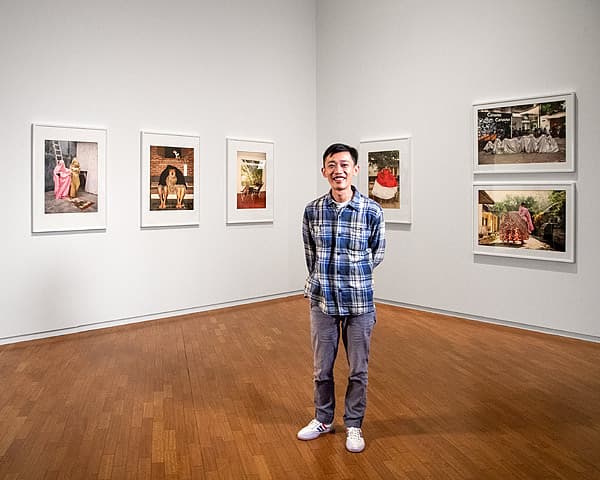Yudha 'Fehung' K. Putera
A visual artist working predominantly in photography, Yudha ‘Fehung’ Kusuma Putera is a second-wave member of MES 56, a leading artist collective founded in 2002 to focus on the development of photographic practice in Indonesia. Fehung’s solo practice has recently pivoted toward the participatory, and the subjects of his work become crucial informants to his soft and nuanced studies of the human condition.
Past, present and future come together 2017 started with his engagement and subsequent musings on his future family life. This led to an earnest enquiry into what makes family, beyond the nationalised, socio-political constructions of the family unit, long politicised as a crucial space for propaganda in Indonesia. Suharto’s Keluarga Berencana (Family Planning) program, based on the concept of ‘small, happy and prosperous families’, promoted a strict, nationalist family ideal: father as leader and protector, loyal wife by his side and two children, one boy, one girl. Suharto often modelled himself as the father of the nation to command and manipulate power, and even today the campaign’s sticky residue of stigma and exclusion still lingers. Same sex couples, couples from differing religions, those who choose not to marry or not to have children, cross-cultural families, divorced parents or adoptive families are just some of the interpretations of the family unit that sit firmly outside that of the state (or socially) sanctioned one.
In Past, present and future come together Fehung reinterprets the family unit in a series of nine intimate photographs. During visits with families either one or two degrees of separation from MES 56, Fehung challenged his subjects to work together to identify the face or the head of their family and what kind of shape they might create using a prop to define their unit, as the artist states, ‘into one solid body’. In one photograph, a dog wrapped in animal print fabric sits at the centre, his family shrouded in black fabric behind. In another, the youngest child perches proudly above his family, who are hidden beneath red and white fabric suggesting the Indonesian flag.
When exhibited, the photographic series forms part of an installation where visitors can participate in the work by wrapping themselves in fabric to create a photograph of their own family unit. Performing new interpretations and representations of family is, after all, not only about what we publicly project, but what we choose to keep for ourselves.
Edwina Brennan

Yudha 'Fehung' K. Putera
